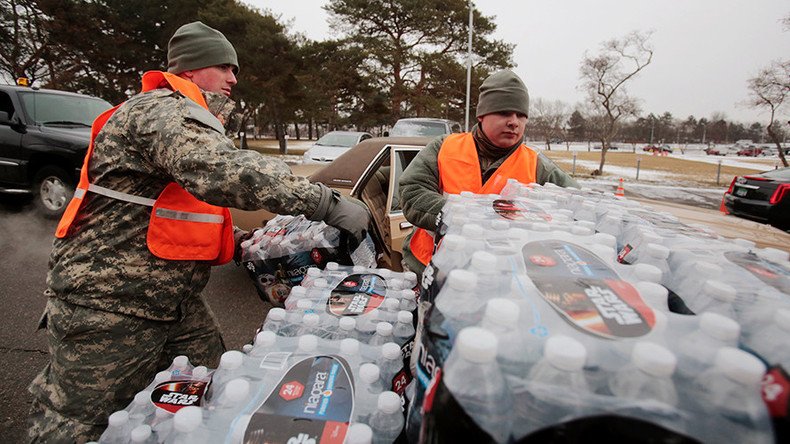$100 million lawsuit filed over Flint Legionnaires’ outbreak as FBI joins probe of water

A lawsuit filed over the Flint, Michigan water crisis claims the state and a hospital did not protect patients during an outbreak of Legionnaires’ disease. The outbreak made 87 people sick and caused nine deaths after the city switched its water supply.
The complaint was filed on Monday in the Genesee County Circuit Court in Michigan, on behalf of four plaintiffs who contracted Legionnaires’ disease during 2014 and 2015.
One of the plaintiffs named is Debra Kidd, 58, who died from Legionella pneumonia on August 2, seven days after she arrived at the hospital's emergency room with a headache, the Detroit Free Press reported.
Flint Legionnaires' Victims File $100M Lawsuit https://t.co/pIrwnSVJGhpic.twitter.com/YCedcrgCZE
— Top News (@topnewsfeedpage) February 2, 2016
Flint’s McLaren Regional Medical Center was named as the principal defendant, along with six named officials of the Michigan Department of Environmental Quality. According to the complaint, they did nothing to combat an outbreak of Legionnaires’ during the water crisis.
The hospital was aware that its water supply was contaminated as early as April 2014, the lawsuit alleges. Over the next 17 months, multiple McLaren’s patients developed Legionnaires’ disease, with a total of 87 people falling ill. Nine people died.
McLaren officials confirmed to The Flint Journal in January that Legionella bacteria was found in the hospital's water supply after the city switched from the Detroit water grid to the Flint River as its principal water source in 2014. Michigan Governor Rick Snyder and officials from the state Health and Human Services Department confirmed last month that the Flint area experienced a spike in Legionnaires' cases beginning in summer 2014.
"The more I read and learn about this, the angrier I get," Geoffrey Fieger, attorney for the plaintiffs, told Michigan Live. "To save a few dollars, the Snyder Administration poisoned an entire city and thought they could get away with it because those poisoned were poor, and primarily black."
The complaint said defendants owed a duty to the plaintiffs to exercise care and prevent unreasonable risk of harm “caused by dangerous conditions on the Defendant’s premises, and to warn of such condition of which it knew, or should have known, existed.”
Despite declaring Flint water safe, MI officials trucked supply into state building – dochttps://t.co/MICkT215VApic.twitter.com/6KvgNAy992
— RT America (@RT_America) January 29, 2016
The complaint claimed the defendants exposed patients to a water supply contaminated with Legionella bacteria, as well as air treatment systems infected with the bacteria. Additionally, it claimed that the hospital failed to properly maintain the water supply, air treatment, and cooling systems that were housing the bacteria, failed to carry out proper disinfection safeguards, and failed to warn patients.
"The damage from the lead poisoning may take years or even decades to see," Fieger told the Detroit Free Press. "These injuries and death were immediate. The water should have been purified."
McLaren Regional Medical Center officials told the newspaper they had not yet seen the lawsuit and declined comment. The state also declined to comment on pending litigation.
Legionella bacteria discovered in water at Flint hospital – report https://t.co/ZsnARpM0tMpic.twitter.com/KyvjTgMMjD
— RT America (@RT_America) January 23, 2016
Meanwhile, the Federal Bureau of Investigation announced it has joined the criminal probe of the Flint water crisis, and is exploring whether any federal laws were broken, Reuters reported.
Peter Henning, a law professor at Wayne State University in Detroit and a former federal prosecutor, told Reuters that under current US environmental laws, there would be a limited prospect for criminal charges unless a false statement was involved.
"You need a lie," he told Reuters. "You need something that is false to build a case."
Failing to recognize the gravity of the situation in Flint would not be sufficient for the FBI to press charges, Henning added.













